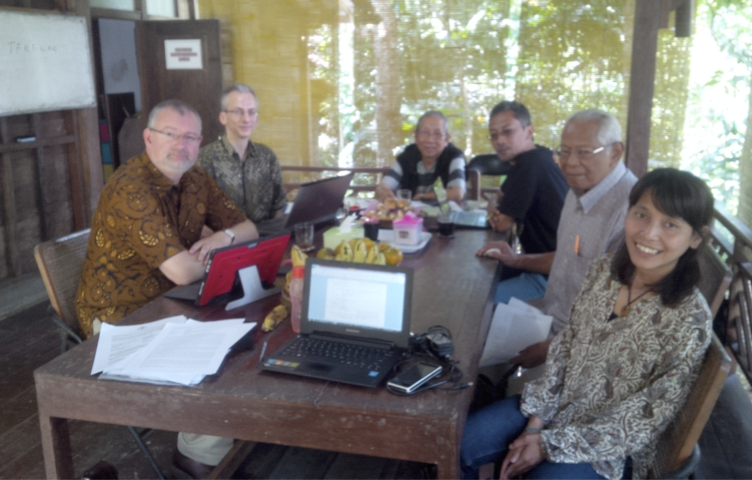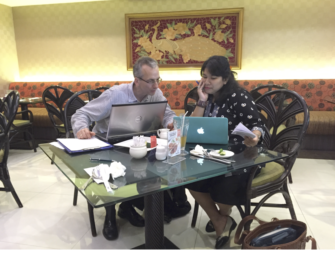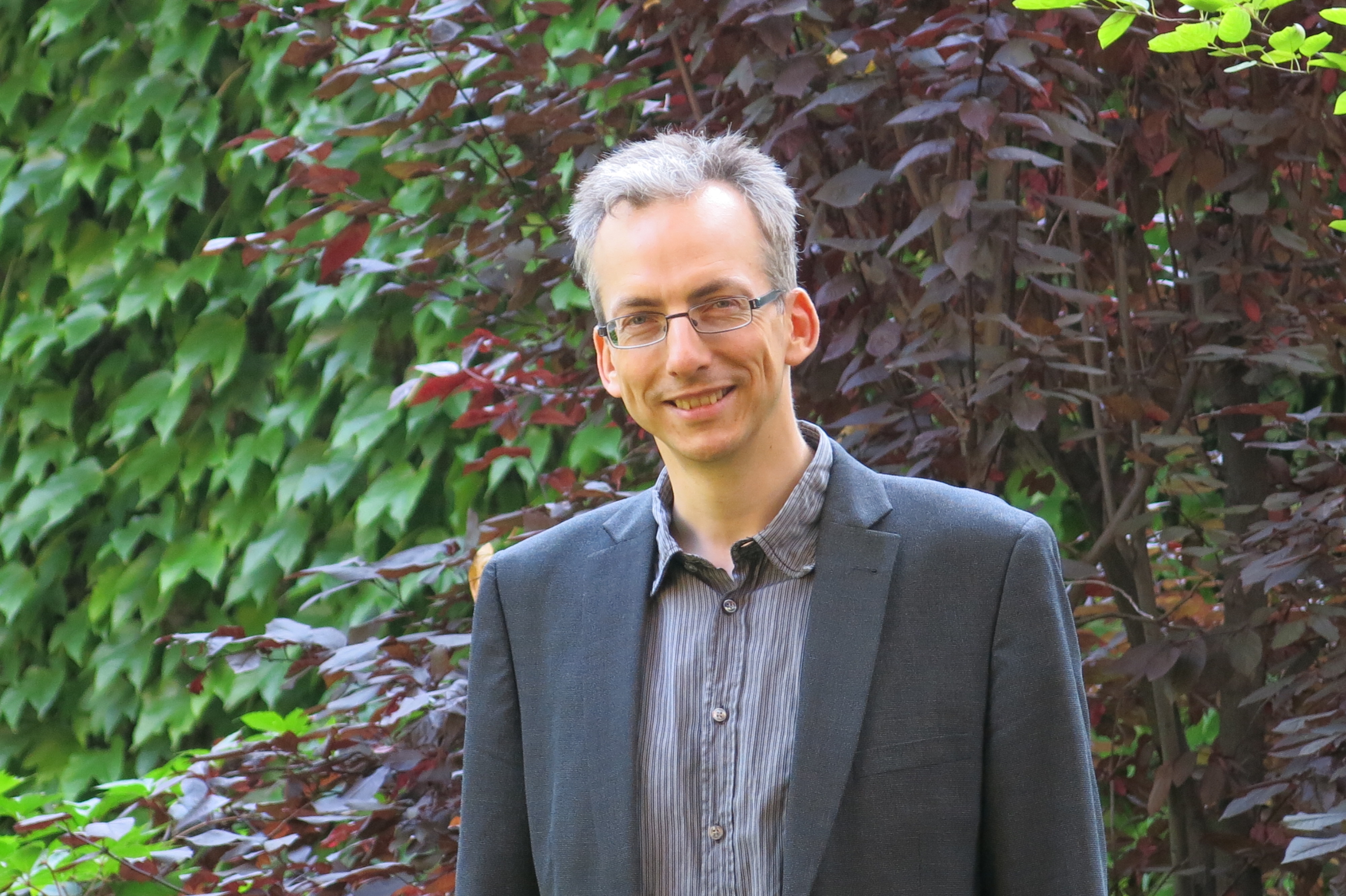
How do young people, of around university age, think and speak about inter-religious encounter in Indonesia? And what, if anything, leads them to change their minds about religious traditions other than their own? These are the questions that we are asking in Java in two contrasting sites: Salatiga and Yogyakarta. Our motivating assumption is that questions of this kind are posed in Indonesia using categories (and in the light of histories) that are distinct from those that have developed in European and North American contexts. This approach suggested itself early on, when familiar European systems of classification (involving ‘exclusivism’, ‘inclusivism’ and ‘pluralism’ for example) failed to do justice to the descriptions of inter-religious engagement given by Indonesian colleagues.
Eckhard Zemmrich (Humboldt University, Berlin) and Nicholas Adams (University of Birmingham, England) are leading a small team of five researchers to investigate these questions. Our team includes local research partners Percik (in Salatiga) and Interfidei (in Yogyakarta). Our local partner institutions arguably have as much experience leading inter-religious engagement in Indonesia as any in Indonesia, having been set up before the fall of Suharto in 1998, and being key actors in the response to the religious violence that erupted at that time.
For young people aged between 16 and 20, the violence of 1998 occurred before they were born or when they were very small. While stories and memories are very much alive in their communities, they themselves did not witness the violence. Further back, the atrocities of the anti-Communist purge of 1965 are deeply etched in those communities, but for young people these events are known only second-hand through the memories of their grand-parents or through such films as The Act of Killing or The Look of Silence. It is likely that for everyone, regardless of age, flare-ups of religious violence today are generally made sense of against the backdrop of the events of 1965 and 1998. However, we have not yet identified a clear pattern in how young people (as opposed to the older community leaders) refer to this historical context, nor is it clear, yet, how deep their knowledge of it is. This is certainly one of the focal questions in our fieldwork.
Our research engages two contrasting groups: university students in Yogyakarta, and young people from villages near Salatiga. We aim to discover how they respond to local inter-religious initiatives and to ask whether these initiatives are relevant only to these local situations or if their approach might be extended to other situations in other countries.
The two locations themselves offer strong contrasts. The Yogyakarta setting is urban, intellectual and relatively affluent: its participants are university students and the political context is for the most part stable. The Salatiga setting is rural and less affluent: the participants are either at school or have just left school, and the political context is more charged. Many of the villages surrounding Salatiga are periodically targeted by outside groups of Muslim hard-liners who encourage local Muslims to sever ties with neighbours from other religious traditions, placing strains on relationships of mutual dependence that may have taken families years to build up. We plan to report on whether the young people in these contrasting locales give similar or different answers to our questions, and–if the answers are different–we consider whether these differences can plausibly be explained by the difference of context, and if so, which differences seem to matter more.
Our primary goal is a before-and-after assessment. What do young people say before they engage with local inter-religious initiatives, and what do they say afterwards? What difference do the local initiatives make? We are also interested to hear how participants have learned about religious traditions other than their own, especially because Indonesian school-children are typically educated with their co-religionists. Muslim children attend Muslim schools, Christian children attend Christian schools, and so on. Digging a little deeper, we want to find out whether young people change their minds (or at least change what they say), and if so we want to make reasonable guesses at the forces which shape these changes: is it related to the kind of information available (or not available); is it conversation with peers from other religious traditions; is it inspiring leadership from inter-religious activists; is it shared study of texts? And at the same time, we are attentive to those cases where young people might not change their minds or might be critical of activities which bring them into conversation with members of other religious traditions.
Our research focuses on three initiatives, two in Yogyakarta and one in Salatiga. In Yogyakarta, we are looking at an undergraduate religion course hosted by Interfidei, in which students from four universities elect to study questions of contemporary religious significance (these change from year to year), and during which trips are arranged to visit sites representative of a variety of local religious traditions. We will also report on a now-annual Peace Camp organised by and for students at Gadjah Mada University, which takes place over two days in the summer, and which includes a variety of inter-religious activities including Scriptural Reasoning. In Salatiga we are researching ‘sobat’ programmes (sobat is Indonesian for ‘friend’) arranged by Percik for young people in neighbouring villages, at which participants from different religious traditions mingle, eat, discuss and consider local challenges. These often take place in the evening, with some including late-night discussions and overnight camping.

It has been suggested to us in conversation with our research partners that the ‘religious question’ (i.e. the question ‘what is your religion?’) is largely a post-1974 issue arising from the legal requirement that official documents name one’s religious tradition. One is unable to receive such documents unless one declares a religious tradition, and so this declaration is largely an ‘administrative matter’. This contrasts strongly with Western contexts: there are administrative cases in European contexts where there is an opportunity to declare one’s religious affiliation (e.g. when being admitted to hospital, to ensure correct dietary or chaplaincy provision), but these are relatively rare, and one is free to name any religious tradition one chooses—even ‘Jedi’, for example. ‘Jedi’ is most certainly not an option on official Indonesian documents. It is possible, in principle, to leave the declaration blank on the official identity card, but in practice it seems few dare to do that.
A recent visit to Thekelan, another village close to Salatiga, revealed that in one prominent family the husband and wife had both become Muslims at the time of their marriage: the groom had been a Buddhist, and the bride a Christian. The reason given for this was ‘to avoid family disagreements’, with a strong impression that this was a pragmatic decision made, perhaps, with comparable seriousness to Western discussions about whether a wife will take her husband’s name, or whether the couple will take a new double-barrelled name. One might test the hypothesis that to take a religious tradition here is like taking a name: it is necessary for documentation, and is arguably something consciously chosen after due deliberation more than being something handed down through generations. This is a central concern for us, and we will explore it in a little more detail in our next blog.
Featured Image Credit: Asian Development Bank. Indonesia: Education. Flickr.com.

